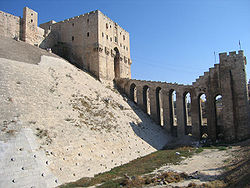
Hamdanid dynasty
Encyclopedia

The Hamdanid dynasty ( Ḥamdānyūn) was a Shi'a Muslim
Muslim
A Muslim, also spelled Moslem, is an adherent of Islam, a monotheistic, Abrahamic religion based on the Quran, which Muslims consider the verbatim word of God as revealed to prophet Muhammad. "Muslim" is the Arabic term for "submitter" .Muslims believe that God is one and incomparable...
Arab
Arab
Arab people, also known as Arabs , are a panethnicity primarily living in the Arab world, which is located in Western Asia and North Africa. They are identified as such on one or more of genealogical, linguistic, or cultural grounds, with tribal affiliations, and intra-tribal relationships playing...
dynasty of northern Iraq
Iraq
Iraq ; officially the Republic of Iraq is a country in Western Asia spanning most of the northwestern end of the Zagros mountain range, the eastern part of the Syrian Desert and the northern part of the Arabian Desert....
(Al-Jazirah
Al-Jazira, Mesopotamia
Upper Mesopotamia is the name used for the uplands and great outwash plain of northwestern Iraq and northeastern Syria and southeastern Turkey which is known by the traditional Arabic name of Al-Jazira , variously transliterated into Roman script as Djazirah, Djezirah and Jazirah...
) and Syria
Syria
Syria , officially the Syrian Arab Republic , is a country in Western Asia, bordering Lebanon and the Mediterranean Sea to the West, Turkey to the north, Iraq to the east, Jordan to the south, and Israel to the southwest....
(890-1004). They claimed to have been descended from the ancient Banu Taghlib
Taghlib
Banu Taghlib or Taghlib ibn Wa'il were a large and powerful Arabian tribe of Mesopotamia and northern Arabia. The tribe traces its lineage to the large branch of North Arabian tribes known as Rabi'ah, which also included Bakr, 'Anizzah, Banu Hanifa and Anz bin Wa'il .The tribe's ancestral...
Christian tribe of Mesopotamia
Mesopotamia
Mesopotamia is a toponym for the area of the Tigris–Euphrates river system, largely corresponding to modern-day Iraq, northeastern Syria, southeastern Turkey and southwestern Iran.Widely considered to be the cradle of civilization, Bronze Age Mesopotamia included Sumer and the...
.
The Hamdanid dynasty was founded by Hamdan ibn Hamdun (after whom it is named), when he was appointed governor of Mardin in SE Anatolia
Anatolia
Anatolia is a geographic and historical term denoting the westernmost protrusion of Asia, comprising the majority of the Republic of Turkey...
by the Abbasid
Abbasid
The Abbasid Caliphate or, more simply, the Abbasids , was the third of the Islamic caliphates. It was ruled by the Abbasid dynasty of caliphs, who built their capital in Baghdad after overthrowing the Umayyad caliphate from all but the al-Andalus region....
Caliphs in 890.
His son Abdallah (904-929) was in turn appointed governor of Mosul
Mosul
Mosul , is a city in northern Iraq and the capital of the Ninawa Governorate, some northwest of Baghdad. The original city stands on the west bank of the Tigris River, opposite the ancient Assyrian city of Nineveh on the east bank, but the metropolitan area has now grown to encompass substantial...
in northern Iraq (906) and even governed Baghdad
Baghdad
Baghdad is the capital of Iraq, as well as the coterminous Baghdad Governorate. The population of Baghdad in 2011 is approximately 7,216,040...
(914).
His sons were installed as governors in Mosul and Aleppo
Aleppo
Aleppo is the largest city in Syria and the capital of Aleppo Governorate, the most populous Syrian governorate. With an official population of 2,301,570 , expanding to over 2.5 million in the metropolitan area, it is also one of the largest cities in the Levant...
.
The rule of Hassan Nasir ad-Daula (929-968), governor of Mosul and Diyarbakır
Diyarbakır
Diyarbakır is one of the largest cities in southeastern Turkey...
, was sufficiently tyrannical to cause him to be deposed by his own family.
His lineage still ruled in Mossul, a heavy defeat by the Buyids in 979 notwithstanding, until 990. After this, their area of control in northern Iraq was divided between the Uqailids and the Marwanid
Marwanid
Marwanid, , was a Kurdish dynasty in Northern Mesopotamia and Armenia, centered around the city of Amed . Other cities under rule were Arzan, Mayyāfāriqīn , Hisn Kayfa , Khilāṭ, Manzikart, Arjish. The founder of the dynasty was a Kurdish shepherd, Abu Shujā Bādh bin Dustak...
s.

Byzantine Empire
The Byzantine Empire was the Eastern Roman Empire during the periods of Late Antiquity and the Middle Ages, centred on the capital of Constantinople. Known simply as the Roman Empire or Romania to its inhabitants and neighbours, the Empire was the direct continuation of the Ancient Roman State...
's (Christian) expansion. His court was a centre of culture, thanks to its nurturing of Arabic literature, but it lost this status after the Byzantine conquest of Aleppo.
To stop the Byzantine advance, put Aleppo under the suzerainty of the Fatimids in Egypt
Egypt
Egypt , officially the Arab Republic of Egypt, Arabic: , is a country mainly in North Africa, with the Sinai Peninsula forming a land bridge in Southwest Asia. Egypt is thus a transcontinental country, and a major power in Africa, the Mediterranean Basin, the Middle East and the Muslim world...
, but in 1003 the Fatimids deposed the Hamdanids anyway.
Hamadanid Rulers
Hamdanids in Al-Jazira- Hamdan ibn Hamdun (868-874)
- al-Husayn ibn Hamdan (895-916)
- Abdullah ibn Hamdan (906-929)
- Nasir ad-Daula (929-967)
- Adid ad-Daula (967-980)
- Abul Tahir Ibrahim ibn al-Hasan (989-997)
- Abu Abdillah al-Husayn ibn al-Hasan (989-997)
Hamdanids in Aleppo
- Sayf al-DaulaSayf al-DaulaAli ibn Abi al-Hayja 'Abd Allah ibn Hamdan ibn al-Harith Sayf al-Dawla al-Taghlibi , more commonly known simply by his laqab of Sayf al-Dawla , was the ruler of northern Syria and the brother of al-Hasan ibn Hamdan , the founder and the most prominent prince of the Arab Hamdanid dynasty from...
(945-967) - Saad al-Daula (967-991)
- Said al-Daula (991-1002)
- Abul Hasan Ali (1002–1004)
- Abul Ma'ali Sharif (1004–1004)

